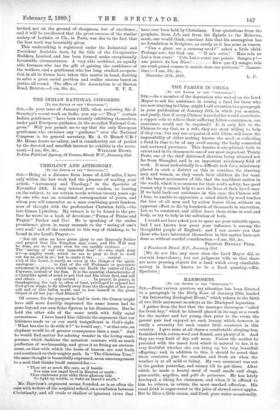THEOLOGY AND ASTRONOMY.
[To THE EDITOR OF THE " SPECTATOH."] 'Sin,—Being at a distance from home of 6,500 miles, I have only within the last week had the pleasure of reading your article, "Astronomy and Theology," in the Spectator of November 24th. It may interest your readers, as bearing on the subject, to see certain words written twenty years ago by one who was an occasional correspondent of yours, and whom you will remember as a man combining great fearless-
ness of thought with the profoundest Christian faith,—the late Canon Lyttelton. My extract is to be found in the pre- face he wrote to a book of devotions ("Forms of Praise and Prayer," Parker and Co.) He is speaking of the undue prominence given in many manuals to the "saving of one's own soul," and of the contrast to this way of thinking, to be found in the Lord's Prayer :— "Not till after we have given glory to our Heavenly Father and prayed that HIS Kingdom may come, and His Will may
be done, are we to pray even for our earthly existence The saving of our own immortal Soul' is—who shall deny it?—a mighty work, which we are to pray to God to work
out for us, and in us ; but to make it the central wish of the heart, is surely an error in the things of the spirit, analogous to that of the old Ptolemaic or geocentric astronomy in physics, which madeour Earth the centre of God's Universe, instead of the Sun. It is the essential characteristic of a Christlike spirit of mind to put God and His Glory first, and self and others only second. In prayer, in praise, in thanksgiving, the soul is, often at least, privileged to expand her God-given wings, to fly utterly away from the thought of her poor self and of this fallen world, and to lose herself in the great Object of all her joy—God Himself."
Of course, for the purpose he had in view, the Canon might have still more forcibly impressed the same lesson had he gone beyond our own Solar System in his illustration. But he held the other side of the same truth with fully equal -earnestness. I have heard him ridicule the argument that our littleness made us or our earth insignificant in God's sight. 'What has size to do with it ?" he would say ; "at that rate, an
elephant would be of greater consequence than a man." And he would find matter for adoring wonder in the loving omni- potence which fashions the minutest creature with as much
perfection of workmanship, and gives it as fitting an environ- ment, as that with which the hosts of heaven are sent forth and continued on their mighty path. In "The Christian Year," the same thought is beautifully expressed, as an encouragement to a soul that thinks itself uncared-for :— "Thou art as much His care, as if beside
Nor man nor angel lived in Heaven or earth : Thus sunbeams pour alike their glorious tide To light up worlds, or wake an insect's mirth."
Mr. Harrison's argument seems founded, as is so often the ease with writers of the sceptical school, on a confusion between Christianity, and all crude or shallow or ignorant views that have ever been held by Christians. Your quotations from the prophets, from Job, and from the Epistle to the Hebrews, must, one would think, convince him that his assumption has no foundation in Scripture, as surely as it has none in reason.
"Can a giant see a caraway-seed?" asked a little child. Perhaps not; but God can. "4 11 m'a creee." Mais eels no Lui a rien coute.' ' Cela Lui a conte une pensee. Songez-y !—
une pensee du bon Dieu! Rien quo d'y songer, oda me rend grand comme le monde dans ma petitesse.' " (Lamar- tine.)—I am, Sir, &c.,


































 Previous page
Previous page